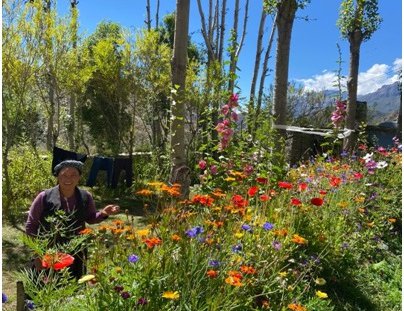
Tourism serves as a significant catalyst for cultural exchange, community enhancement, and the stimulation of global economies. In 2023, the tourism industry is projected to account for 9.1% of the global GDP, generating millions of jobs and nearing pre-pandemic figures.
Tourism plays a crucial role in Nepal's economy, accounting for over 6.7% of the national GDP and serving as a significant source of foreign currency. The diverse geography of the country, which includes the Terai plains and the towering Himalayas, establishes it as a leading destination for travelers, with each region offering unique attractions. A significant development in the tourism industry is the growing participation of women, especially in the realm of mountain tourism.
In Upper Mustang, women have traditionally held an indirect and often unacknowledged role in the tourism industry. Their contributions were primarily viewed as an extension of domestic responsibilities rather than a formal economic participation. Due to restricted access to education and the region's remoteness, many women remained in conventional roles.
As tourism expanded, there emerged a necessity for new competencies, including language proficiency and hospitality training. This development enabled women to assume prominent leadership positions, thereby facilitating their financial independence, enhancing their social recognition, and fostering a sense of self-worth. This transition represented a significant transformation in their roles within the community.
Currently, women constitute over 75% of the hospitality workforce in Upper Mustang. This demographic shift has not only provided them with financial autonomy but has also elevated their social standing. Young female entrepreneurs are leveraging digital platforms such as Facebook, Instagram, and Google Maps to promote their businesses to a worldwide audience. This trend underscores the adaptability and resilience of women in capitalizing on the opportunities arising from the burgeoning tourism sector. By occupying key positions, they have become essential contributors to the tourism experience in the region.
Women in Upper Mustang fulfill the role of cultural ambassadors, directly engaging with tourists to highlight local traditions, culinary offerings, and customs. The cooks employed in guesthouses prepare exceptional dining experiences that combine traditional tastes with international elements, thus elevating the region's charm.
Despite these advancements, women continue to encounter considerable obstacles. Social norms and gender dynamics persist in restricting their access to essential resources, including education, training, and financial assistance. Women from more affluent communities, such as the Bista and Gurung, enjoy better access to these opportunities, whereas those from marginalized groups, like the Ghara, face systemic inequalities.
The seasonal nature of tourism further exacerbates the vulnerabilities experienced by women, particularly those from disadvantaged backgrounds. Many struggle to maintain their businesses during the off-peak season. Additionally, the scarcity of local labor has prompted migration from other rural areas in search of job opportunities.
Regrettably, young migrants frequently find themselves in low-wage, labor-intensive positions within the tourism industry, which intensifies the issue of child labor. For numerous young women, early familial responsibilities hinder their ability to pursue education, thereby perpetuating cycles of poverty and restricting future prospects.
Since the advent of federalism, the local government in Upper Mustang has become increasingly proactive in promoting women's involvement in mountain tourism. Training initiatives, such as those focused on cooking and weaving, have equipped women with valuable skills that are marketable, enabling them to diversify their income streams and attain financial independence.
Infrastructure enhancements in Upper Mustang, including improved roads and transportation systems, have significantly increased tourism and generated new business prospects for women. The integration of modern financial technologies, alongside traditional savings methods like dhukuti, has empowered women to safeguard their livelihoods and invest in their enterprises. Consequently, women are achieving greater financial and social independence, thereby contributing to the local economy and supporting their families. Their resilience, leadership, and empowerment are pivotal in fostering personal development and advancing the tourism sector in Nepal. These women are not only facilitating economic progress but also instigating social transformation, illustrating the beneficial effects of tourism on individuals and communities.
Manisha Pudasaini, who recently earned her Master's degree in Development Studies from Kathmandu University, possesses a profound interest in migration, mountain tourism, and sustainable livelihoods. She is dedicated to connecting global concepts with local solutions to foster equitable growth and cultivate resilient communities through both research and practical initiatives. She can be reached at pudasaini.manisha@gmail.com.
- Tourism On The Edge: Nepal’s Never-Ending Struggle
- Jun 25, 2025
- Connecting Communities And Tourism In Gandaki
- Feb 01, 2025















